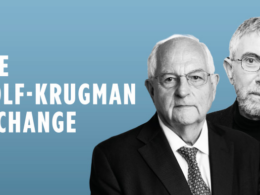This article is an on-site version of our Moral Money newsletter. Premium subscribers can sign up here to get the newsletter delivered three times a week. Standard subscribers can upgrade to Premium here, or explore all FT newsletters.
Visit our Moral Money hub for all the latest ESG news, opinion and analysis from around the FT
Hello from Brussels, where I’m spending a few days digging into the outlook for EU green policy under the second term of European Commission President Ursula von der Leyen. The commission is looking at a potential dilution of sustainability disclosure rules to reduce burdens on businesses — but some big investors are getting nervous about where this could lead.
More on that below, and we’ll have a broader look at the EU’s green strategy in a forthcoming edition of this newsletter. First, we take a look at how rising competitive pressure is weighing on altruism in the legal sector. See you on Friday.
legal affairs
Inside the post-Covid comedown in free legal support
For a profession widely seen as hard-nosed and mercenary, lawyers have a remarkably ingrained habit of working for free. Pro bono practice for charities or other good causes is a long-standing feature of the legal landscape, especially at US firms. But as competition in the sector intensifies, lawyers’ commitment to the public good is coming under strain.
Today the Thomson Reuters Foundation published its latest global survey of pro bono legal practice, with responses from 209 law firms in 123 jurisdictions. The survey found that lawyers at those firms did an average of 35.6 hours of pro bono work last year — down from a peak of 43.4 hours in 2020, and 43 hours in 2014, the first year of the survey.
First, some caveats. Pro bono hours in 2020 were boosted by the disruption of the Covid-19 pandemic, when many areas of corporate legal work slowed down, and restrictions on daily life meant many lawyers had more time on their hands. The 2014 survey had roughly half the number of respondents as the latest one, meaning that these numbers should not be seen as an apples-to-apples comparison. And the declining trend in pro bono work has been driven largely by the US, offsetting modest long-term increases in other countries.
But there’s no doubt that lawyers’ appetites and capacity for pro bono work has been coming under pressure in the past few years, said Carolina Henriquez-Schmitz, director of TRF’s TrustLaw initiative, which carried out the research. A rebound in fee-earning work following the pandemic has left lawyers with fewer hours available. The adoption of artificial intelligence and other forms of technology — rather than freeing up more time for lawyers — has further added to the intensity of the competition, as firms tussle to gain a new edge on rivals, Henriquez-Schmitz added.
And while the new survey did not show any hard evidence that the political backlash against “woke capitalism” has hurt pro bono practice, the risk on that front seems clear. Politically contentious fields, such as support for migrants and LGBTQ causes, have been major areas of pro bono work among law firms in recent years.
US law firms have long done far more pro bono work than international peers. Reasons include the country’s relatively weak public legal aid system, and the emphasis placed on pro bono work by regulatory and legal industry bodies. But US firms reported an average of 63 pro bono hours per lawyer last year, down from 75 in 2014.
In contrast — and despite a widespread fallback from 2020 levels — hours elsewhere have been creeping up over the past decade: from 21 to 24 in England and Wales; from 12 to 15 in the rest of Europe; and from 12 to 17 in Asia-Pacific (excluding Australia, a long-standing outperformer, where the number declined from 45 to 40 hours).

One reason to be bullish on the long-term outlook for pro bono work is that law firms are increasingly focused on the business benefits it can bring. While they still cite a “desire to support the community” as the main motivation for this work, the survey shows a big increase in the importance given to other areas such as skill development, staff retention, and alignment with client interests.
Laura Jones, head of the pro bono practice at London-based law firm Simmons & Simmons, argued that pro bono work makes her colleagues “better lawyers” by confronting them with different sorts of legal challenges.
“It has a huge impact on morale as well,” she added. “We see that we have a skill that is desperately needed by people in our communities, and nobody’s oblivious to that. We’re all human beings, despite being lawyers.”
SUSTAINABILITY REPORTING
Institutional investors warn against EU green policy U-turn
This is an important week in the twisting saga of EU green policy. Today and tomorrow, European Commission officials will consult with business and civil society representatives on the simplification of the EU laws that require corporate sustainability reporting.
It’s part of an intense focus on competitiveness under the new administration of Ursula von der Leyen, who began her second term as commission president in December.
Following complaints from corporate lobby groups, von der Leyen has promised a new “omnibus” legislation that will reduce the reporting burden on businesses.
But for one large group of institutional investors, this has set alarm bells ringing. Yesterday, 162 investors controlling an aggregate €6.6tn in assets were among the signatories to a statement urging the commission to “preserve the integrity and ambition of the EU’s sustainable finance framework”.
The signatories, including Axa Investment Management, L&G Asset Management and Nordea Asset Management, argued that businesses and financial market participants needed long-term policy stability. The phased implementation of rules such as the Corporate Sustainability Reporting Directive was already having an impact, by making useful information available to investors, they added.
The document strikes a stark contrast with the tone taken by other groups — notably BusinessEurope, a confederation of national lobby groups across Europe, which has been a major advocate for deregulation. In a document last month, it raised questions about the sustainability regulations’ “cumulative cost, the complexity of their implementation and ultimately the competitiveness impact for our companies”.
In their statement yesterday, the investors said they supported the idea of “streamlining” the various reporting standards and providing “clear implementation guidance” for businesses. “However, reopening these regulations in their entirety risks creating regulatory uncertainty and could ultimately jeopardise the Commission’s goal to reorient capital in support of the European Green Deal.”
Smart reads
Change of plan Norwegian energy company Statoil said it will halve its planned spending on renewables while increasing its 2030 target for fossil fuel production by 10 per cent.
Parting ways Jeff Bezos’s $10bn Earth Fund has cut its ties with the Science-Based Targets initiative, for which it had been a key funder.
Power struggle Industry executives have warned that Donald Trump’s renewable energy restrictions risk sparking an electricity crisis in the US.
Source link









